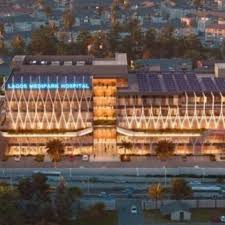LAGOS MEDI PARK – NEW VISTAS ON OLD GROUNDS
By Femi Olugbile
The tall structures have since come down. The old stained-glass window that showed an image of a mother and her child is no longer in evidence. What is left in a rugged uneven expanse of brown earth.
The guests are gathered in an air-conditioned tent. A long green carpet is laid out for the Governor, who is coming to perform the ground-breaking ceremony. A huge banner shows a large-scale architect’s projection of the new Lagos Medi Park. The picture reveals a number of structures sitting below and above a flat plane – the architect, when he gets to speak calls it a ‘mangrove concept’. It is ergonomic and in harmony with the environment.
The tent is filling up rapidly.
Standing outside and savouring the atmosphere, it occurs to you that there are few locations as iconic as the spot you are standing on. It was a fixture of the Lagos landscape even before the construction of the Third Mainland bridge, whose upward sweep from Awolowo road now skirts its perimeter. It was a tall building that could be seen for miles around. The complex housed the Lagos School of Nursing from its establishment in1965. Nurses and midwives in their uniforms would regularly walk along the road past Race Course to General Hospital Odan where they worked and received their practical training.
In 2013 after a lull, the school reopened at a new facility in the grounds of the General Hospital at Igando. The Awolowo Road structure became a ghost town.
As early as 2014, within the State’s Secretariat at Alausa, rumours circulated about a plan to work with some diaspora people to build a Medical Park on the site. It sounded like a moonshot.
And then, four years ago, serious discussions commenced between the Lagos State Government and the Iwosan Investments group. The discussions were long and complex. In the end, it was agreed that a unique, 140-bed Medi Park would be delivered to Lagos, on the old grounds of the School of Nursing, by ‘IASO MEDIPARK SPV’, a consortium led by Iwosan Investments, owners of Iwosan Lagoon Hospitals. Radical Technology (Technology Solutions) would be co-promoters, along with El-Alan (Construction Services), and Verraki Partners (Business Innovation Consultants). It would be a world-class facility where all the medical specialties, including Emergency Medicine and Advanced Life Support, would be practiced, for the benefit of Lagosians and Medical Tourists from other parts.
The groundbreaking ceremony by the Governor today is the culmination of that long process. Already signed is a 40-year Build, Operate and Transfer (BOT) agreement that would eventually revert the structures back to the ownership of the people of Lagos. 20% of the bed capacity would be reserved for the care of indigent citizens of Lagos.
Back inside the tent, the excitement is building up. The Deputy Governor is already seated.
Fola Laoye, the CEO of Iwosan Investments, scion of Professor Adeyemo Elebute who, with his wife, Professor Oyinade Elebute, birthed the Lagoon Hospital concept as a post-retirement engagement, is fussing around, trying to ensure that everyone is ready for the Governor’s arrival. Between her exertions she stops to take photographs with various people – including Fola Adeola, the Chairman of Iwosan Investment, and her husband Ade Laoye, who is the lead Architect on the project. She is keeping up a regular conversation with her friend Tatiana who is wearing a wide smile.
Tatiana Mousslli Nouri is a Lagosian, a fact she readily asserts to anyone who asks. Her Lebanese parents, the Elias family, came to Lagos in the 1880s, and have been here since. Tatiana grew up in Maryland, until her family moved to Victoria Island. Founder of Radical Technologies, who are partners in the SPV, she, like Fola, has a passion for good causes, and clearly believes the Lagos Medi Park is one, though it’s also long-term business.
In April 2020, Fola and Tatiana, with other friends, built the Eti Osa COVID Isolation Centre on the grounds of Landmark Centre. It had 80 beds, including 10 ICU beds, and deployed 150 volunteer medical personnel. The centre ran for six months at the height of COVID, saving lives, free of charge.
At last, the word comes that the Governor has arrived. He comes in, wearing a green round-neck vest under his jacket. He shakes hands right and left, beaming.
Adesua the MC calls the proceedings to order with a rendition of the National Anthem.
Mrs Laoye delivers her welcome address. There is a tone of nostalgia, as she remembers that the School of Nursing building was the icon by which she recognised she was in Lagos whenever she came in as a child from her family home in Surulere. Every speaker intentionally and exuberantly accentuates the nostalgia element thenceforth. Tatiana attended the French School nearby. Fola Adeola discloses he lives close by ‘temporarily’, even as he tries to corral more of his heavyweight friends who are in the tent to add their ‘patient capital’ to the investment. Ade Laoye, the architect, remembers he attended St Gregory’s College nearby, and his mum was a nurse. The Commissioner for Health, not to be left out, recalls he was born at the old Creek Hospital nearby, delivered by Dr Abimbola Awoliyi, Nigeria’s first Obstetrician. The Governor tops it all in his speech by recalling he grew up in Surulere where the fences were low and the people were hip, and that they used to make fun of people from Ikoyi hereabouts and keep them on the fringe at parties.
The Governor makes his way outside to perform the groundbreaking.
In the end everybody is invited to step on the podium, in front of the glittering image of the ‘mangrove concept’ Lagos Medi Park that is about to replace the old School of Nursing, opening new vistas and bringing a new lease of life to Lagos Health.
Everybody flashes a V-sign and shouts ‘Lagos Medi Park’ into the cameras.

